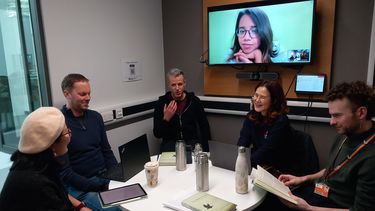Science, Technology and Medicine in Society (STeMiS)
Science, technology and medicine are pervasive parts of contemporary society. The STeMiS theme is interested in how knowledge is made, how technologies are developed, how these come to be employed in different settings and with what implications for social relations.

Our academic staff members working in this area are a vibrant and diverse group of researchers drawing on a number of sociological perspectives, but all share a common interest in the relationship between society and science, technology and/or medicine. Much of our work is inter-disciplinary and we have links with colleagues and networks across all faculties at the University of Sheffield, including the iHuman centre within the Faculty of Social Sciences.
Some examples of questions we are currently grappling with:
- How can data visualisations make data more accessible to ordinary citizens?
- What are the implications of new knowledge about the human body and brain and new technologies with the potential to change these for understanding what it means to be human?
- What does self-monitoring mean for the people who undertake it and what are the implications of self-monitoring practices for the wider provision of healthcare?
- How do ideas of race circulate in various biomedical contexts?
- How are visual technologies such as MRI changing medical practice and parents' experience of foetal and neonatal post-mortem?
- To what extent might digital media enhance bottom-up, patient-centred health practices?
- What assumptions about the good life, death and suffering underpin statutory measures of 'quality of life'?
Our major research areas include:
- Digital societies
- Sociology of Health and Illness
- Science and Technology Studies
- New materialisms and posthumanism
For more information on our work in STeMiS, please contact Dr Preeti Raghunath or Dr Greg Hollin. We have an active mailing list, so please contact us if you’d like to be added.
Reading Groups
Alongside a roster of activities across the year, members of STeMiS run reading groups that take place at regular intervals during semesters:
Contemporary STS
We run a Contemporary Science and Technology Studies (STS) reading group, where colleagues read recent books and papers. Sessions are hybrid and we have a small breakout room for folks who would like to come in person. Please email Greg Hollin to be added to the mailing list for this group, and to receive invites to the hybrid meetings.
Previous works we’ve read include Aniket Aga Genetically Modified Democracy; Cara New Daggett The Birth of Energy; Kregg Hetherington The Government of Beans; Max Laboiron Pollution is Colonialism; Michelle Murphy The Economization of Life.
The contemporary STS reading group
Sociology of health and illness
PhD Student Charli Colegate also runs a Sociology of Health and Illness reading group in the school. The reading group meets monthly between 3 and 4pm on Wednesdays and, each month, a different member of the reading group picks a couple of papers, situated within the sociology of health and illness, for the group to discuss.
Colleagues can contact Charli Colegate to receive invites to the group, and can also suggest articles and book chapters for future weeks.
Sign up to our newsletter
Would you like to hear more about research happening in our school? Every six weeks we share our research newsletter, which includes the latest news, publications, events and lots more activity. You can sign up to our school's research newsletter.

